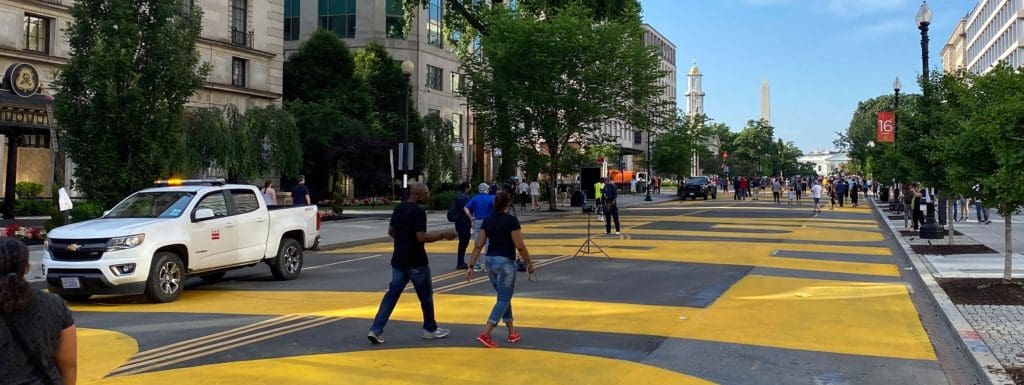Early on Saturday morning, I walked from my home in Washington, DC to downtown’s new Black Lives Matter Plaza. It is only a few blocks from our office, which has remained mostly empty since COVID-19 hit in mid-March. Now boarded up, one might look at our office building and feel anxious about what’s to come. But I didn’t feel that on Saturday. While I arrived a little earlier than most of the crowds, which would later draw thousands of people, there was still an energy in the air. You could feel the anticipation, joy lingering, and the nervousness. It’s interesting how the tone of these racial justice protests has shifted over the last week.
It left me feeling hopeful and deeply reflective that the vast majority of protesters, everyday people, are using their first amendment rights to call attention to systemic human suffering, and sustain that attention for days, if not weeks. When I look at the protests, I don’t see angry mobs or violent looters. I see solidarity, which is a profound act of love. Solidarity is any action that makes explicit that we as individuals are inextricably connected to each other, that we are radically interdependent, that when one of us suffers, all of us suffer – and when one of us is freed from oppression, all of us experience freedom. It is in solidarity, then, that love will manifest. A peaceful protest with all its heart and determination is one of the most authentic expressions of love for one another.
As I worked my way through the square and stood with the amazing diversity of people – Black, white, Asian, Indigenous, Latino, young, old, LGBTQ+, and religious of every sort – I was struck by the critical role these peaceful protests play in energizing American civil society. I was also struck by the myriad organizations that have been supporting these efforts for years and will be essential to carrying this work forward in the years to come. I saw congregations organized to give voice to their values and give water to the thirsty. We know that in Minnesota, a nonprofit called the Minnesota Freedom Fund has been raising money to bail out protesters in the city where George Floyd was murdered. Black Lives Matter, which started as a movement in 2013 after Trayvon Martin’s killer was acquitted, is now a global 501(c)(3) working to eradicate white supremacy and build local power to intervene in cases of violence inflicted on Black communities in the U.S., U.K., and Canada. It’s quite a gift we have as Americans that we individually and collectively can use our voices to call on our systems to change in favor of human flourishing, and we can build and rebuild organizations that are designed to carry that work forward in the years to come.
These movements and peaceful protests are powerful acts of solidarity, of love, and of civil society. They are made up of people who have been fighting in this struggle for years, if not decades, alongside young people who may have just woken up to the injustices their fellow Americans face every day. I walked back to my home Saturday morning feeling a deep sense of gratitude for the people who marched that day, for the rich diversity of organizations that make up the nonprofit sector, for the resilience for our society in service of human flourishing, and for the peace that these crowds are showing to catalyze lasting social change.
Thank you to everyone who takes up their private actions for public good. Consider Independent Sector partners in any effort that strengthens civil society. To that end, we will be going deeper on these topics in our June 16 Upswell Pop-Up with the chief equity officers of the cities of Pittsburgh, Chicago, and Minneapolis, the founder of PolicyLink, Angela Glover Blackwell, and others. Register today. You don’t want to miss it.



